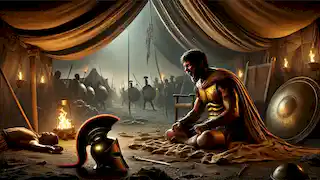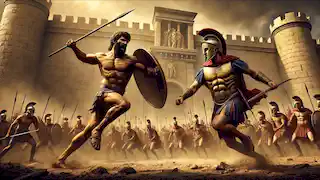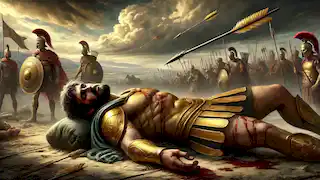The Tale of the Achilles' Heel
Reading Time: 5 min

About Story: The Tale of the Achilles' Heel is a Myth from greece set in the Ancient. This Dramatic tale explores themes of Courage and is suitable for All Ages. It offers Cultural insights. A legendary tale of strength, fate, and the vulnerability that defines us all.
In the lush hills of ancient Greece, where olive trees danced with the wind and marble temples stood as monuments to human achievement, there lived a warrior whose name echoed across the ages: Achilles. His name was synonymous with valor, strength, and the profound vulnerability that would forever define him. Yet, the tale of Achilles is not merely about a hero who fell; it is the story of how even the mightiest can be brought low by their humanity. The story of Achilles begins not with his exploits on the battlefield but with his birth. His mother, Thetis, was a sea nymph, renowned for her grace and divine lineage. His father, Peleus, was a mortal king of Thessaly. Their union was both a blessing and a curse, for it was foretold that their child would grow to be greater than his father, yet doomed to a short and glorious life. As the cries of the infant Achilles filled the halls of Peleus, Thetis was gripped by a mother’s dread. Determined to shield her son from his fate, she devised a plan. Thetis carried her infant to the River Styx, a boundary between the mortal and immortal realms. Submerging him in its sacred waters, she sought to make him invincible. Yet, as she held him by his heel, the waters did not touch that single part of his body. Achilles grew into a figure of awe. Tall, strong, and imbued with the blessings of a god, he was trained by the centaur Chiron in the arts of war, medicine, and music. Chiron, wise and nurturing, taught him more than the art of combat—he imparted lessons on leadership, empathy, and restraint. Despite his divine gifts, Achilles was not without his flaws. His temper burned hot, and his pride often clouded his judgment. These traits, as much as his heel, would prove to be his undoing. Still, his reputation spread far and wide, and kings and generals sought his allegiance. When the Trojan War erupted—a conflict sparked by the abduction of Helen, the most beautiful woman in the world—Achilles was summoned. Initially reluctant, he was persuaded by the promise of eternal glory. He joined the Greek forces under King Agamemnon, bringing with him his loyal Myrmidons, warriors as fierce and unyielding as their leader. Achilles’ arrival at Troy was nothing short of spectacular. He cleaved through enemy lines with ferocity unmatched, his golden armor gleaming under the sun. His fame grew with each passing day, and the Trojans trembled at the mention of his name. The seeds of tragedy were sown not on the battlefield but in the Greek camp. A dispute arose between Achilles and Agamemnon over the spoils of war, specifically a captive woman named Briseis. Insulted and enraged, Achilles withdrew from the conflict, refusing to fight. His absence was keenly felt, as the Trojans, led by Prince Hector, began to gain the upper hand. Achilles’ wrath burned like a wildfire. Isolated in his tent, he wrestled with his pride and the sting of humiliation. Yet, when his closest friend, Patroclus, donned his armor and led the Myrmidons into battle in his stead, the story took a tragic turn. Patroclus was slain by Hector, and Achilles’ grief transformed his rage into a force of nature. Emerging from his tent like an avenging god, Achilles rejoined the fray. His duel with Hector became the stuff of legend—a clash of two titans whose destinies were entwined. Achilles emerged victorious, but his triumph was hollow. Dragging Hector’s body behind his chariot, he displayed a barbarity that shocked even his comrades. It was only through the intervention of Priam, the aged king of Troy and Hector’s father, that Achilles began to confront his humanity. Priam’s plea for his son’s body stirred something deep within the warrior. In an act of compassion, Achilles returned Hector’s remains, earning a semblance of redemption. Despite his victories, Achilles could not escape his fate. The gods themselves had decreed his doom, and their instruments were many. It was Paris, Hector’s brother, who loosed the fateful arrow. Guided by Apollo, it struck Achilles in his one vulnerable spot—his heel. The great warrior fell, his life spilling onto the sands of Troy. Yet, even in death, Achilles achieved the immortality he had sought. Songs of his valor spread across the known world, his name becoming synonymous with the tragic hero. The tale of Achilles endures because it is a mirror to the human condition. His strength and vulnerability, his rage and compassion, reflect the duality within us all. Achilles teaches us that even the mightiest have their weaknesses, and it is in embracing them that we find our true selves. In the end, Achilles’ heel was not merely a flaw but a reminder of his humanity. It is why his story resonates across millennia, reminding us that greatness is not measured by invincibility but by the courage to face our vulnerabilities.Prologue: A Prophecy is Made
The Young Hero

The Call to War
The Wrath of Achilles

Vengeance and Victory
The Heel of Destiny

Legacy of Achilles


















